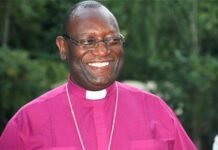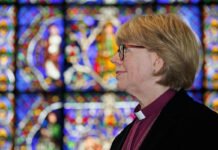Moscow (Agenzia Fides) – The possible introduction of a change of the liturgical calendar to allow all Christians in the world to celebrate Easter on the same day “is not on the agenda of the Orthodox Church, or at least it is not on the agenda of the Russian Orthodox Church”, and in any case the Russian Orthodox have “no intention” of changing the traditional system with which the date for the Easter celebration is fixed in their Church.
This was stated in a recent television interview by Metropolitan Hilarion of Volokolamsk, chairman of the Moscow Patriarchate’s Department for External Church Relations. The declaration of the authoritative representative of the Moscow Patriarchate has nipped in the bud recent attempts to reopen the debate on an issue that continues to represent a painful emblem of historical lacerations and the lack of full sacramental communion between the Catholic Church and many Eastern Churches. In many areas of the world, starting with the Middle East, the spectacle of the “divided Easters”, celebrated on different days by Christians, ends up being a veil to their common confession of the name of Christ. This year, the Easter celebration for the Eastern Churches that follow the so-called Julian Calendar is set for May 2nd.
The last to try to rekindle the hope of seeing sooner or later all Christians celebrate the Lord’s resurrection on the same day was the Orthodox Archbishop Job of Telmessos, a member of the Ecumenical Patriarchate of Constantinople, co-President of the International Joint Commission for Theological Dialogue between the Catholic Church and the Orthodox Church. In an editorial published in February 2021 issue of the Bulletin of the Permanent Delegation of the Ecumenical Patriarchate to the Ecumenical Council of Churches (CEC). Archbishop Job recalled the rule established at the Council of Nicaea (325 AD) according to which Easter should be celebrated on the first Sunday following the first full moon of spring. In 2025, 1700 years will be celebrated since that Council of the undivided Church, and precisely in that year, by providential coincidence in the different methods of calculation, Christians all over the world will celebrate Easter on the same day.
“Perhaps” Job added in his text “the celebration of the 1700th anniversary of the Council of Nicaea in 2025 could be a good opportunity to remind Christians of the need to reform the calendar to define a common Easter date and truly remain faithful to the provisions of the first ecumenical council. The fact that the eastern and western dates of Easter coincide in that year should be taken as an encouragement in that direction”. The perspective suggested by Archbishop Job was welcomed and re-launched by Cardinal Kurt Koch, President of the Pontifical Council for the Promotion of Christian Unity, in some statements published by the online agency cath.ch.
Now, the intervention that puts the brake on all this, by the Russian Orthodox metropolitan Hilarion, took its cue from the declarations of Archbishop Job of Telmessios, revealing the unwillingness of the Russian Orthodox Church to change the method of calculating the date of Easter. Interviewed by a Russian television network, Metropolitan Hilarion recalled that the question of the different dates for celebrating Christian Easter periodically re-emerges in the ecumenical debate of recent decades. “But the question here is very simple: who should change their Paschal calendar? For example, we are not going to change it”. Hilarion pointed out that the question of the date of celebration of Easter is linked to the need to adopt the so-called Gregorian calendar, instead of the so-called Julian calendar still used by the Church of Byzantine and Slavic Orthodoxy to determine the day of celebration of Easter.
“From time to time”, Hilarion stressed, ” some people say that we should bring our church calendar in line with the secular calendar. Such attempt was even made in the Russian Church in the 1920s, when Patriarch Tikhon issued an order to switch our calendar to the new style, and two weeks later this order had to be canceled, since the church people did not accept it”.
In recent years there have been signs of agreement regarding the purpose of overcoming the “divided Easter” of Christians, especially in the Middle East and Arab countries, especially between the Coptic Orthodox Church and the Catholic Church. Coptic Patriarch Tawadros II expressed the urgency to unify the date of celebration of Easter already in a letter sent in May 2014 to Pope Francis, on the occasion of the first anniversary of his first meeting in the Vatican. In May 2015, during a visit he made to the Netherlands, the Primate of the Church added that the “working” hypothesis from which we must start is to set for all Christians the celebration of the Resurrection of Christ “on the third Sunday in April”.




“Christians all over the world will celebrate Easter on the same day”
Every Sunday?
First, I’m partial to Hilarion and hope that when the KGB operative Kyril (Curley) meets his idols, Mao (Moe) and Lenin (Larry), Hilarion will bring some reason and intelligence when he is named patriarch. That said, I think the ROC is a heretical albatross on Orthodoxy. They are Russian first and foremost, anti-West second, with Orthodox falling further down the line.
Granted it could be due to translation errors but he implies that the Gregorian calendar is secular (which it is) without noting that their Julian calendar was attributed to Julius Caesar, 50 years BC. There is nothing intrinsically holy about any calendar. They are all secular methods to mark events and the passage of time. In fact all, or at least most, nations where the Orthodox are present including Russia follow the Gregorian calendar. Besides, Easter is a movable feast – not fixed – with “Orthodox” Easter more wildly transient than “Western” Easter. Given that transience no one will ever notice the move to the Western calculation. This is an easy chip to give away to further greater goals.
But Russians are too self-absorbed to understand the bigger picture.
Why does this matter?
Because our disunity is a scandal to the message of the Gospel. Of course there are many more issues that divide Christendom, but few are as trivial as calendar disagreements. As I said above, Easter is transient, no one will ever notice. Frankly, if we can’t agree on this how can we progress on other matters?
That’s not disunity in any sense that Jesus meant. So not, its not a scandal to the message of the Gospel.
We don’t need to agree on the date of Easter anymore than we need to agree on the colour of the carpet or tiles in the church building.
Fair enough, but I find it bizarre that Easter is not tied to Passover. It would seem to me there’s some fruitful ministry to be done if it were. It ties the Passion to its context, helps make the point that Easter is about much more than an arbitrary date.
I agree. I read somewhere a long time ago (and I can’t vouch for the accuracy of this) that the Roman Church at one point deliberately chose a different point of reference (phase of the moon or whatever) to distance itself from Jewish tradition. But I think the date of Easter should be tied to Passover.
That’s easy – just convert the world and churches to use a lunar calendar, then you can get Easter to coincide with Passover.
While you are at it, arrange a supervisory body to insert a 13th month 7 years out of every 19, as well as extra days from time to time.
The reason Easter does not coincide with Passover is on purpose: The Father’s didn’t want Christian celebrations to coincide with Jewish ones.
I imagine few Anglicans know Met. Hilarion is a friend of at least one ACNA bishop. This is because the ACNA bishops are the only ones the Orthodox take seriously. I certainly hope the ACNA continues to take itself seriously. Anyway, the Met is one of if not the only great writer the Russian Church has. Multi volume church history, articles on theology, and (I’ve not heard this) a composer of classical music. As to why the Orthodox are obstinate on dating Easter. It’s trivial, that’s why. The annual whine always comes from liberal protestants toward the Orthodox, never in the other direction. Orthodox who do not follow the old calendar always follow it for Easter, as with the Orthodox Church In America. We know it’s not as accurate as Gregorian, it’s not an issue. Probably it’s because we aren’t interested in celebrating something we take seriously with a vast number of people who don’t. When Anglicans (ACNA excluded for now) can be certain that maybe 10% of their bishops actually believe the Creed and that Easter really means what we know it does, then give us a call to get us interested in celebrating that event at the same time. Till then and when we are less slow about things we are more than happy, overjoyed, to celebrate the resurrection of our Lord and God and Savior Jesus Christ without reference to those who don’t.
You will find that the vast majority of Anglicans in the world (and their bishops) take Easter just as seriously as you do. We also believe the Creeds, “for they may be proved by most certain warrants of holy Scripture.”
So rejoice!
The earliest British Christians celebrated Easter on the same date as the Orthodox and did so until the Synod of Whitby.
Just noting a point of interest.
There are a couple of Russian Old Believers communities in western America. One in Homer, AK and another in Oregon. The story is the Russians cleaned up some of the translation errors from the original Greek by their patron founder. The Old Believers stuck with the original translation as that is what the Holy Spirit blessed for so many years.
One member I worked with said that in defiance of the new translation and the Czar’s mandate, his grandfather moved to China and then someplace in South America before settling in Oregon.